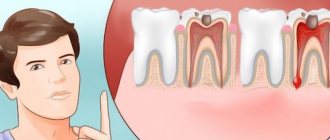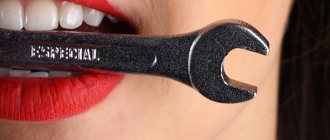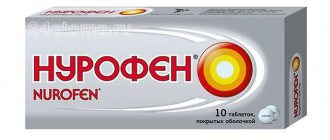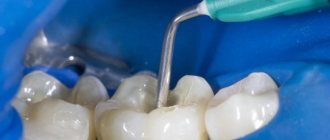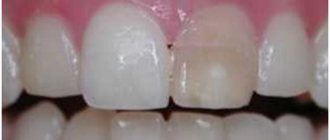Toothache: causes
Pain in a tooth can appear for several reasons, namely due to the action of mechanical (air flow), thermal (cold, heat) and physical (sweet, salty) stimuli. It can be either short-lived or last the whole day, causing discomfort to the person.
The most common cause of toothache is tooth decay. Other common causes [Official Source] include tooth chipping and exposure of dentinal tubules at the root through apical gingival recession (displacement of the gum margin without inflammation) caused by aggressive brushing or surgery.
In addition, toothache can occur after fillings and other dental operations. As a rule, it does not last long and the patient is advised to take a painkiller and abstain from eating for a while.
Possible causes of toothache:
- pulpitis (inflammation of the pulp - the internal tissue of the tooth);
- periostitis (inflammation of the periosteum - periosteum);
- pericoronitis (inflammation of the soft tissue around an erupted tooth);
- bruxism (grinding)/teeth grinding;
- severe pain after tooth extraction (dry socket syndrome).
If you experience toothache, you should consult a doctor immediately. Only a specialist can prescribe effective painkillers for toothache.
Most often, dentists recommend taking the medications presented in the next section.
Will it help?
Of course, before taking painkillers for a toothache, you should assess the degree of pain and think about the potential consequences of taking medications. In fact, according to statistics, very few people think about these aspects as soon as they experience pain in the oral cavity.
The most important fact is that relieving toothache with tablets will only be a temporary solution. This approach will help alleviate the general condition, but only for a certain time.
It should also be noted that tooth pain is often accompanied by concomitant symptoms, which manifest themselves in inflammation of the gums, cheek area, increased body temperature and a feeling of general malaise. Many of the tablets help relieve secondary manifestations, but have no effect on the cause.
This is why in most cases a visit to the dentist will still be required. After all, the painkiller will simply reduce the level of pain, but not for long. Moreover, in many situations the ongoing disease will only gain momentum and the pain will increase. Therefore, there is no point in enduring without visiting a doctor for a long period with persistent toothache.
What to drink if your tooth hurts: the best painkillers for toothache
There are two groups of drugs that are best used to relieve toothache. These include: analgesics and NSAIDs (non-steroidal anti-inflammatory drugs).
Analgesics for toothache
These medications eliminate the source of pain by affecting the nerve endings and pain centers in the brain. However, analgesics, unlike NSAIDs, do not affect inflammatory processes and cannot eliminate inflammation of the pulp, periosteum, and gums.
Some drugs from this group, in addition to the analgesic effect, also have an antipyretic effect - they are called analgesics-antipyretics. Such medications can eliminate toothache and reduce the fever that accompanies it. Thus, analgesics-antipyretics help get rid of two unpleasant symptoms at once.
Paracetamol is considered the most popular and safe drug from this group.
Paracetamol
This medication has analgesic and antipyretic properties. It begins to act 30 minutes after administration, after the same time the maximum concentration of the active substance in the body is reached. Paracetamol can be used by children over 6 years of age (in tablet form, dosage 200 mg), adults, pregnant and lactating women.
The effect of the drug lasts 4 hours. This remedy can also be combined with other drugs to enhance their effectiveness. Paracetamol is quite safe, as it has a small list of side effects, and cases of their occurrence are recorded extremely rarely.
Contraindications for use:
- chronic alcoholism;
- serious liver disorders;
- hypersensitivity to paracetamol.
If you have a toothache and this causes your temperature to rise, then the safest thing to do is take a drug whose main active ingredient is paracetamol.
NSAIDs for toothache
Non-steroidal anti-inflammatory drugs suppress the production of prostaglandins (hormone-like substances that cause pain and inflammation in the body), resulting in reduced pain and inflammation. In addition, drugs from this group also have an antipyretic effect.
However, they cause a large list of side effects for the gastrointestinal tract and cardiovascular system. Therefore, they must be taken according to the instructions and prescription of the doctor. It is important to note that medical experts do not recommend taking non-steroidal anti-inflammatory drugs on an empty stomach, as this can lead to negative consequences.
There is a list of contraindications for which NSAIDs should not be taken:
- combined use with other drugs from the NSAID group;
- allergic reactions to the active and auxiliary substances of non-steroidal anti-inflammatory tablets for toothache, as well as powders, ointments and suspensions;
- severe renal, liver or heart failure;
- diseases of the gastrointestinal tract (ulcers, gastritis, Crohn's disease, ulcerative colitis) in the acute stage;
- previous heart surgeries and progressive diseases of the cardiovascular system;
- existing or recent internal bleeding;
- blood clotting disorders.
If you have a toothache and there are no contraindications listed above, then you can take an NSAID tablet.
The most effective painkillers for toothache from the group of non-steroidal anti-inflammatory drugs include: Nurofen, Nimesil, Ketanov, Dexalgin and Olfen.
Nurofen
Used to relieve mild to moderate toothache. The main active ingredient is ibuprofen, its maximum concentration in the blood plasma is reached after 45 minutes if taken on an empty stomach, or after 2 hours if taken on a full stomach.
After oral administration, ibuprofen is quickly absorbed and begins to relieve pain, relieve inflammation and reduce temperature. The half-life of the drug lasts 2 hours.
In addition to the standard contraindications for NSAIDs, ibuprofen should also not be used by women in the last trimester of pregnancy, as this can negatively affect the health of the baby.
Nurofen in tablet form for toothache can be taken by children over 6 years old if their body weight exceeds 20 kg.
To avoid negative reactions from the stomach and the entire gastrointestinal tract, it is recommended to take the drug after meals.
Ibuprofen tablets, which are film-coated, reduce the risk of side effects from the digestive system.
Nimesil
The main active ingredient of the drug is nimesulide. Nimesil is a light yellow powder that has a pronounced citrus smell.
When taken orally, nimesulide is quickly absorbed from the stomach and enters the bloodstream, and the maximum plasma concentration of 100 g of this active substance is achieved 2-3 hours after administration.
It is recommended to take Nimesil for toothache after meals. Nimesulide powder should be poured into a glass, pour 100 ml of water, stir and drink.
An additional contraindication to its use, in addition to the general contraindications for the NSAID group, is the combined use of nimesulide with analgesics and the presence of infectious fever.
It should not be taken by children under 12 years of age, pregnant or nursing mothers, or people with kidney or liver disease.
Ketanov
This drug is used against severe and moderate toothache. Its main active ingredient is ketorolac tromethamine. Ketanov is not addictive, and the strength of its analgesic effect is compared to morphine. This drug is much stronger and more effective than other members of the NSAID group.
Ketanov for toothache has an effect 60 minutes after a person takes the tablet, and the maximum effect of the drug appears after 2-3 hours.
The medication should be taken on a full stomach, because taking the painkiller on an empty stomach increases the risk of side effects. A few hours before and after taking Ketanov, it is recommended not to eat fatty foods, as it slows down the speed of its action.
It should be noted that the presence of urticaria, bronchial asthma, cerebrovascular bleeding and tonsillitis in a person is considered contraindications to the use of the drug.
Children are allowed to drink Ketanov for severe toothache only from the age of 16, and it is not prescribed to lactating women, pregnant women and people with chronic heart, kidney and liver diseases.
Dexalgin
The main component is dexketoprofen. Dexalgin relieves toothache 30 minutes after oral administration. The duration of the analgesic effect is 4-6 hours, and the duration of removal of the medication from the body is 1-3 hours.
Dexalgin is contraindicated for use in patients with bronchial asthma and hemorrhagic diathesis. In addition, it is strictly prohibited for children, women during lactation, pregnant women to drink it and should be taken with caution by people over 65 years of age. And patients who have problems with the kidneys and liver need to reduce its minimum dosage.
Dexalgin must be prescribed by a doctor, since this medicine, like all NSAID drugs, is available by prescription.
Olfen
The main active ingredient is diclofenac. It inhibits the biosynthesis of prostaglandins, thereby suppressing toothache and inflammation. It can also reduce elevated body temperature.
Contraindications to the use of Olfen are:
- cardiac ischemia;
- angina pectoris or previous myocardial infarction;
- peripheral artery disease;
- cerebrovascular pathologies.
The effect begins to appear 30 minutes after administration, and the maximum concentration in the blood occurs after 120 minutes.
Olfen is available by prescription after being prescribed by a doctor.
Let's go through the list
This material is not an advertisement for any products, so we will list the most suitable solutions in tablets for toothache in alphabetical order:
- Analgin.
- Ibuklin.
- Ketanov.
- Ketorol.
- Moment.
- Nise.
- Nimesil.
- Nurofen (ibuprofen and drugs identical to this group).
- Sanaprox.
- Tempalgin.
Ketanov is considered one of the most suitable options when asking what you can drink for toothache. It has a sufficient speed of impact, that is, fast, and at the same time effective. In some cases, such tablets help relieve even severe pain. But you should remember about the frequency of administration and dosages.
Nurofen not only helps relieve pain, but also has an anti-inflammatory and antipyretic effect on the entire body. You should be aware that some of the modifications of these toothache tablets contain a potent substance in the form of codeine. We are talking about variations of Nurofen Plus and Nurofen Plus N. It will also enhance the analgesic effect. The classic version can be used to relieve toothache in both adults and children.
A simple option with classic toothache tablets in the form of Analgin is also popular in the fight against this disease. The main substance here is sodium metamizole, which, due to its acidic structure, has a negative effect on enamel. For this reason, if there is damage in the latter, the area of carious lesions may increase. But if the filling falls out or is chipped, it will be effective.
How often can you take painkillers for toothache?
All of the above drugs for toothache are taken symptomatically. They are not designed for long-term use.
Painkillers must be prescribed by a doctor and the frequency and duration of use must be indicated in the prescription. After dental operations, as a rule, strong painkillers are prescribed for toothache, which include Nimesil, Ketanov, Olfen, Dexalgin. And for moderate and mild toothache that has arisen for the first time, you can take paracetamol or ibuprofen.
It is recommended to take any NSAID drug after meals in the dosages prescribed by your doctor.
If the tooth reacts to cold and hot and hurts, then you need to see a dentist. The doctor will identify the cause of the discomfort and treat it.
If you experience recurring attacks of toothache, contact a specialist immediately.

